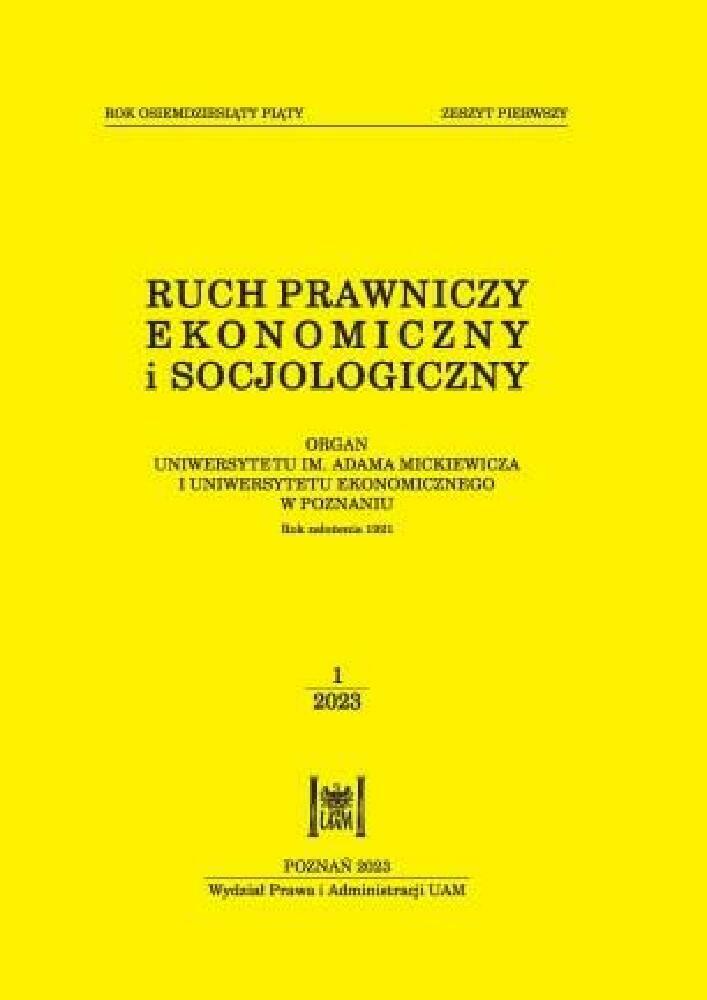Abstrakt
Sprawna organizacja zamówień publicznych w instytucjach zamawiających rzutuje bezpośrednio na efektywność ich udzielania i wykonywania. Zasada efektywności zamówień trafiła ostatnio do katalogu nadrzędnych zasad ustawowych z uwagi na utrzymujące się trudności w praktycznym (organizacyjnym) jej urzeczywistnieniu, wynikające głównie z niewystarczającej znajomości jej znaczenia prawnego. Trudności, także naukowe, potęgują się w związku z koniecznym sprzężeniem rozwiązań organizacyjnych z wymaganiami prawa cywilnego, administracyjnego, a także prawa pracy. Dlatego celem artykułu jest usunięcie zaistniałej luki poznawczej, przede wszystkim w zakresie znaczenia prawnego regulaminów, podstaw i zasad funkcjonowania komisji przetaragowej na tle pozycji kierownika, charakteru prawnego indywidualnych poleceń służbowych oraz statusu pracowników „rzeczowo właściwych” działających po stronie publicznego zamawiającego. Dokonane ustalenia pozwalają na sformułowanie kilku wniosków i postulatów de lege ferenda. W szczególności w odniesieniu do instytucji publicznych niezbędne jest ustawowe określenie znaczenia prawnego regulaminów udzielania zamówień publicznych oraz poleceń wydawanych podległym pracownikom, podstaw odpowiedzialności karno-administracyjnej członków komisji przetargowej oraz „pracowników rzeczowo właściwych”, w imię zasady, że za uchybienia odpowiadają w pierwszej kolejności sprawcy, natomiast kierownik zamawiającego co najwyżej za zaniedbanie nadzoru. Ponadto pożądane wydaje się unormowanie statusu „pracowników rzeczowo właściwych” jako bardziej samodzielnych, zatrudnianych z uwzględnieniem warunku niezbędnej wiedzy fachowej, doświadczenia i kompetencji zawodowych, zapewniających profesjonalną obsługę zamówień publicznych.
Bibliografia
Bielikow-Kucharska, M. (2016) Odpowiedzialność za naruszenie dyscypliny finansów publicznych w obszarze zamówień publicznych. Warszawa.
Błaś, A. (2013). Formy prawne w sferze działań wewnętrznych administracji publicznej. W: R. Hauser, Z. Niewiadomski, A. Wróbel (red.), System prawa administracyjnego. Tom 5: Formy działania administracji (s. 279–294). Warszawa.
Dorre, D. (2020). [Komentarz do art. 29]. W: A. Sobczyk (red.), Kodeks pracy, komentarz. Warszawa: Legalis/el.
Gonet, W. (2021). Zasady zamówień publicznych. W: P. Bielarczyk, W. Gonet, A. Wójtowicz-Dawid (red.), Zamówienia publiczne (s. 63–92). Warszawa.
Gordon, Z. (2013). Charakterystyka prawna trybów udzielania zamówień publicznych z elementami negocjacji. Prawo Zamówień Publicznych 4: 44–58.
Granecki, P., I. Granecka, I. (2021). Prawo zamówień publicznych. Komentarz. Warszawa.
Horubski, K. (2017). Administracyjnoprawne instrumenty zamówienia publicznego. Warszawa.
Kania, M. (2020). Zasada efektywności w nowym Prawie zamówień publicznych. Prawo Zamówień Publicznych 1: 1–10.
Lipiec-Warzecha, L. (2016). Dyscyplina finansów publicznych. Warszawa.
Małecka-Łyszczek, M. (2020). Kontrola zamówień publicznych. Warszawa.
Matusiak, A. (2021). [Komentarz do art. 54 i 56]. W: M. Jaworska (red.), Prawo zamówień publicznych. Komentarz (s. 165 i 176). Warszawa.
Mikos-Sitek, A. (2020). Ustawa o finansach publicznych. Komentarz. Warszawa: Legalis/el.
Nałęcz, M. (2019). [Komentarz do art. 29]. W: W. Muszalski (red.), Kodeks pracy, Komentarz. Warszawa. Legalis/el.
Nowak, H., Winiarz, M. (2021). Prawo zamówień publicznych. Komentarz. Warszawa.
Olejniczak-Szałkowska, E. (1981). Granice obowiązku posłuszeństwa poleceniom służbowym w administracji. Acta Universitatis Lodziensis, Folia Iuridica 3: 155–171.
Plebanek, E. (2000). Odpowiedzialność karna w zamówieniach publicznych. W: Odpowiedzialność osobista urzędników w zamówieniach publicznych (s. 319–468). Warszawa.
Robaczyński, W. (2013). O charakterze odpowiedzialności za uchybienia popełniane przy udzielaniu i wykonywaniu zamówień publicznych. Prawo Zamówień Publicznych 4: 116–126.
Sawicka, K. (2007). Kontrola wewnętrzna gospodarki finansowej jednostek samorządu terytorialnego. Gdańskie Studia Prawnicze 16: 73–96.
Stahl, M. (2007). Cele publiczne i zadania publiczne. W: J. Zimmermann (red.), Koncepcja systemu prawa administracyjnego (s. 95–125). Warszawa.
Szostak, R. (2013). Zakres i struktura prawa zamówień publicznych. Prawo Zamówień Publicznych 4: 3–26.
Szostak, R. (2020). Uwarunkowanie odpowiedzialności za naruszenie dyscypliny finansów publicznych. W: Odpowiedzialność osobista urzędników w zamówieniach publicznych (s. 99–200). Warszawa.
Licencja
Prawa autorskie (c) 2023 WPiA UAM

Utwór dostępny jest na licencji Creative Commons Uznanie autorstwa 4.0 Międzynarodowe.





